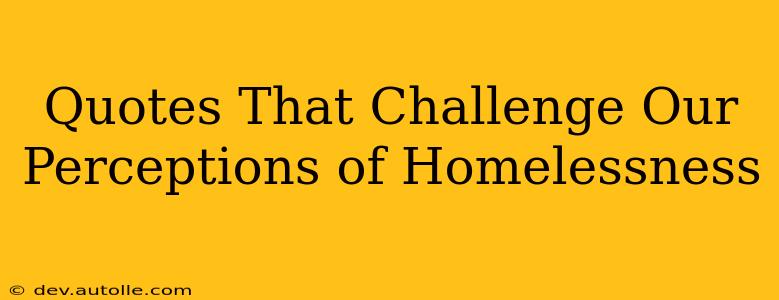Homelessness is a complex issue, often reduced to simplistic narratives in the public consciousness. We see individuals on the streets and quickly form judgments, often fueled by misconceptions and ingrained biases. But powerful quotes, from those experiencing homelessness and those working to alleviate it, can challenge these preconceived notions and offer a glimpse into the realities of this multifaceted problem. This article explores impactful quotes and delves deeper into the often-overlooked aspects of homelessness.
What are some common misconceptions about homelessness?
Many misconceptions surround homelessness. People often assume that all homeless individuals are:
- Lazy or lack ambition: This couldn't be further from the truth. Many individuals experiencing homelessness have faced significant challenges, including job loss, mental health issues, domestic violence, or unforeseen circumstances that led to their situation. Their stories are diverse and complex, often reflecting systemic failures rather than personal failings.
- Addicted to drugs or alcohol: While substance abuse can be a contributing factor for some, it's not the sole cause of homelessness for the vast majority. Many individuals experiencing homelessness are battling other significant hurdles – poverty, lack of affordable housing, and mental health crises. Addiction should be treated as a health issue, not a moral failing.
- All the same: Homelessness is not a monolithic experience. Individuals experiencing homelessness come from diverse backgrounds, with unique stories, challenges, and aspirations. Generalizing their circumstances ignores the vast spectrum of individual experiences.
What are some impactful quotes about homelessness that challenge perceptions?
Powerful quotes from individuals who have experienced homelessness offer a poignant perspective often missing from mainstream narratives:
-
"Homelessness isn't a choice. It's a consequence." This simple yet profound statement highlights the systemic issues, such as lack of affordable housing and inadequate support systems, that contribute to homelessness. It's a stark reminder that homelessness is rarely a voluntary state.
-
"It's not about the lack of a house, it's about the lack of hope." This quote emphasizes the psychological and emotional toll of homelessness. Feeling hopeless and disconnected from society is a significant part of the experience.
-
"People see a cardboard box, I see a life." This quote challenges the dehumanization of homeless individuals. It urges us to see past the visible signs of homelessness and recognize the person behind the circumstances.
-
"We need to treat the cause, not just the symptoms." This is a call for systemic change. Addressing the root causes of homelessness, such as poverty and lack of affordable housing, is crucial for long-term solutions.
How can we change our perspective on homelessness?
Changing our perspective requires empathy, education, and action:
- Empathy: Put yourself in the shoes of someone experiencing homelessness. Consider the challenges they face daily and the resilience they demonstrate.
- Education: Learn more about the root causes of homelessness. Understand the complexities of the issue and the various factors that contribute to it.
- Action: Support organizations that work to combat homelessness. Volunteer your time, donate, or advocate for policies that address the issue.
What resources are available to help people experiencing homelessness?
Numerous resources are available to assist individuals experiencing homelessness, varying by location and specific needs. These resources often include:
- Emergency shelters: Providing temporary housing and basic necessities.
- Soup kitchens and food banks: Offering meals and food assistance.
- Healthcare services: Providing access to medical care, mental health services, and substance abuse treatment.
- Job training and placement programs: Assisting individuals in securing employment.
- Housing assistance programs: Helping individuals find and secure affordable housing.
Finding these resources requires research tailored to the specific geographic location and needs. Local government websites and community service organizations are excellent resources for obtaining this information. It’s crucial to remember that navigating these services can be challenging, and support from case managers and advocates is often essential.
Conclusion
Homelessness is a complex societal issue, demanding a comprehensive response that moves beyond superficial understandings. By challenging our preconceived notions and embracing empathy, education, and action, we can work toward creating a more just and equitable society where everyone has access to safe and stable housing. The quotes highlighted here serve as a powerful reminder of the human stories behind the statistics, urging us to see individuals, not just their circumstances.

